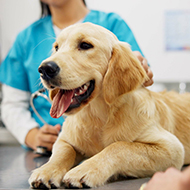Agreement to develop E. coli O157:H7 vaccine
.jpg)
Researchers at work on the project in the Roslin Institute
Roslin Technologies has signed an agreement with animal sciences research establishments Moredun Research Institute, Scotland’s Rural College and the Roslin Institute at the University of Edinburgh, to fund the commercial development of an E. coli O157:H7 vaccine for cattle, which it is claimed will prevent illness in humans.
E. coli O157:H7 is a pathogenic bacterium of cattle that can cause life-threatening food-borne illness in humans through the consumption of contaminated products, such as dairy products and meat. Despite efforts to reduce contamination of food, E. coli O157:H7 causes one to 10 cases per 100,000 people, with certain countries having clusters of more virulent strains – notably the UK, USA, Argentina and Sweden.
The experimental vaccine has been developed to limit E. coli O157:H7 shedding from – and transmission between – cattle. Although the bacteria do not harm cattle, farmers will be encouraged to vaccinate animals against infection with this new vaccine. Early results have indicated that this vaccine may be more effective than other previous attempts and have a greater impact in reducing human exposure and infection.
The project team has been led by Dr Simon Wheeler COO of Roslin Technologies, with significant input from the principal investigators, Professor David Gally from Roslin Institute and Dr Tom McNeilly from Moredun Research Institute, who have been doing the fundamental research necessary to really understand whether the vaccine works and the essential science behind it.
Under the new agreement, Roslin Technologies will perform a two-step validation trial from May to September 2020 in Nebraska, USA. The field trials will examine ‘super-shedding’ in cattle to discover whether the vaccine prevents shedding of the bacteria and is viable for commercial use.
The background research was funded in part by UK agencies Defra (Department for Environment, Food & Rural Affairs), BBSRC (Biotechnology and Biological Sciences Research Council, FSA/FSS (Food Standards Agency/Food Standards Scotland), and other commercial partners. This valuable contribution is recognised by the project team.



 The CMA has invited comments on a draft survey invitation letter, as it continues its investigation into consumer experience.
The CMA has invited comments on a draft survey invitation letter, as it continues its investigation into consumer experience.